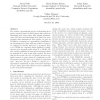Free Online Productivity Tools
i2Speak
i2Symbol
i2OCR
iTex2Img
iWeb2Print
iWeb2Shot
i2Type
iPdf2Split
iPdf2Merge
i2Bopomofo
i2Arabic
i2Style
i2Image
i2PDF
iLatex2Rtf
Sci2ools
SODA
2010
ACM
2010
ACM
On the Equilibria of Alternating Move Games
We consider computational aspects of alternating move games, repeated games in which players take actions at alternating time steps rather than playing simultaneously. We show that alternating move games are more tractable than simultaneous move games: we give an FPTAS for computing an -approximate equilibrium of an alternating move game with any number of players. In contrast, it is known that for k ≥ 3 players, there is no FPTAS for computing Nash equilibria of simultaneous move repeated games unless P = PPAD. We also consider equilibria in memoryless strategies, which are guaranteed to exist in two player games. We show that for the special case of k = 2 players, all but a negligible fraction of games admit an equilibrium in pure memoryless strategies that can be found in polynomial time. Moreover, we give a PTAS to compute an approximate equilibrium in pure memoryless strategies in any 2 player game that admits an exact equilibrium in pure memoryless strategies.
Related Content
| Added | 30 Jan 2011 |
| Updated | 30 Jan 2011 |
| Type | Journal |
| Year | 2010 |
| Where | SODA |
| Authors | Aaron Roth, Maria-Florina Balcan, Adam Kalai, Yishay Mansour |
Comments (0)

